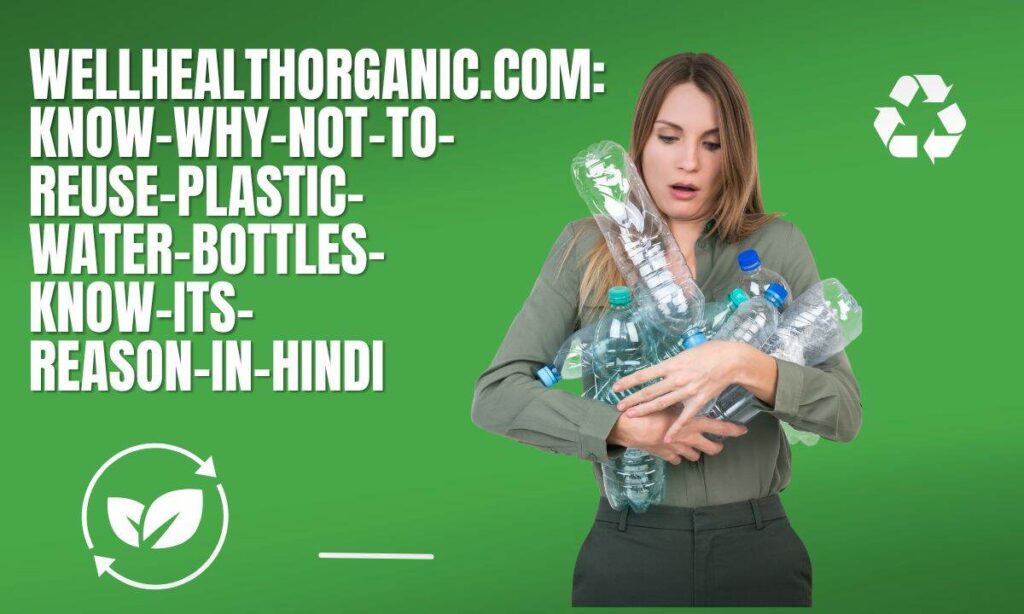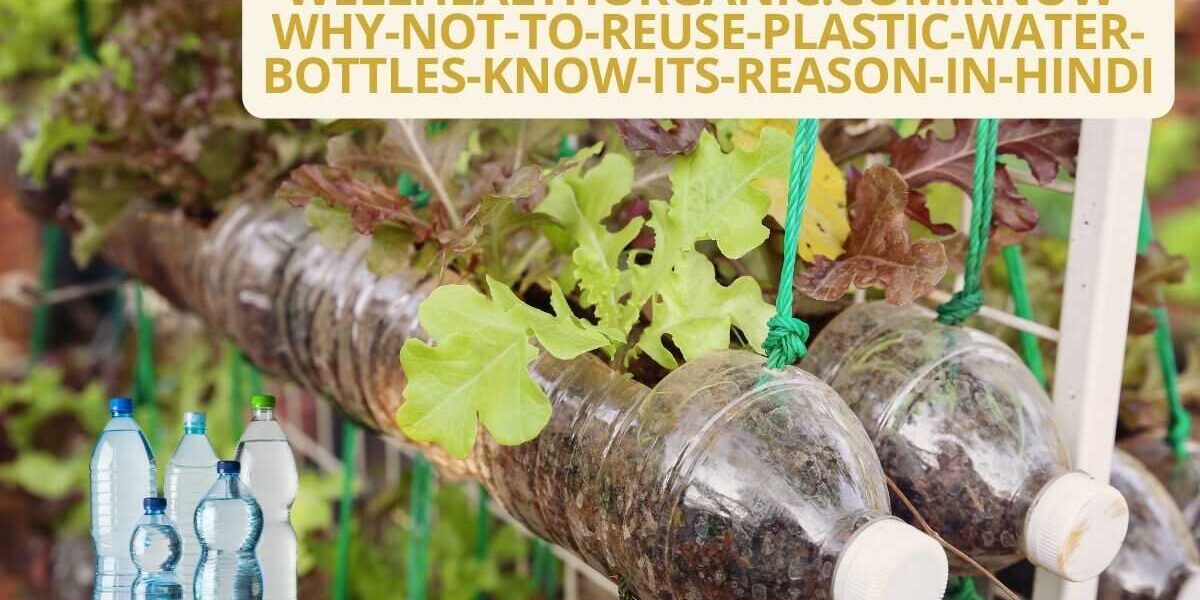Introduction
In a world where environmental effects become more and more important, controversy over reusing plastic water bottles burns on. Is it better to utilize alternatives or should we just fill up and reuse these handy containers again? Here at wellhealthorganic.com:know-why-not-to-reuse-plastic-water-bottles-know-its-reason-in-hindi, we explore the complex arguments for the recommendation against recovering plastic water bottles. Come explore the complex reasoning behind this suggesting position.
Understanding the Challenge
Due to its widespread nature, plastic presents a serious risk to the environment. The whole life cycle of it causes pollution, destroys communities, and harms animals from manufacture to disposal. Auditing our usage of plastic water bottles is one of the sustainable living behaviors we promote at wellhealthorganic.com:know-why-not-to-reuse-plastic-water-bottles-know-its-reason-in-hindi.
The Dangers of Plastic
At first appearance, plastic bottles—which generally consist of polyethylene terephthalate (PET)—might appear harmless. But they are not without peril. The plastic decreases with each usage, perhaps releasing toxic substances into the water. These substances, which may duplicate hormones in the body and cause a variety of health issues, include phthalates and BPA.
Environmental Impact and Health Concerns
Environmental Impact
There is an environmental degradation caused by the continued usage of plastic water bottles. The lengthy degradation time of these bottles might cause harm to ecosystems and wildlife when they wind up in dumps or the ocean. To reduce our impact on the environment and save the earth for future generations, consider switching to glass or stainless steel bottles instead.
Health Concerns
Because of toxic leaching, reusing plastic water bottles can potentially be harmful to your health. When plastic breaks down, potentially harmful compounds like BPA and phthalates are discharged into the water. Taking water contaminated by these pollutants can lead to hormonal imbalances, reproductive problems, and even some types of cancer. It’s imperative to be aware of the various risks associated with reusing plastic bottles and to choose better options wherever feasible in order to protect our health.
Delving Deeper
We find a few essential factors to take into account when we go more into the topic of wellhealthorganic.com:know-why-not-to-reuse-plastic-water-bottles-know-its-reason-in-hindi. The degradation of plastic increases the risk of chemicals falling into the water, to start particularly when bottles are exposed to heat or sunshine. Consuming certain chemicals, including phthalates and BPA, can be harmful to human health.
The effects of plastic pollution on the ecosystem are also unchangeable. The rising issue of garbage buildup in landfills and seas increases by every thrown plastic bottle, affecting ecosystems and animals.
We may choose our hydration practices with more knowledge if we understand these complications. Selecting safer options, such as glass or stainless steel bottles, reduces our environmental impact in addition to lowering our exposure to dangerous chemicals. By looking deeper, we can discover how our choices will affect things more broadly and give us the capacity to alter things for the better in terms of the environment and our own health.

Protecting Your Health
Our daily decisions have an impact on our ability to stay healthy. The safety of the water we drink is an important factor to think about, particularly when it comes to recycling plastic bottles. We may save ourselves from potential problems related to chemical leaching by refraining from reusing plastic water bottles.
When plastic bottles are used regularly and break down over time, dangerous substances like phthalates and BPA may get into the water. Several health difficulties, such as hormone imbalance and reproductive problems, have been connected to these substances.
By limiting our exposure to these dangerous substances, selecting safer options like glass or stainless steel bottles can help protect our health. We may actively move toward a healthy lifestyle by putting a high priority on our health and making intelligent choices regarding the water containers we use.
Higher Than Simpleness
Even though plastic water bottles could be convenient, it’s important to think about the bigger picture when making decisions and to go beyond this benefit. While it may seem handy, reusing plastic bottles can have serious consequences that go beyond simple usefulness.
The influence on the environment is the first priority. Plastic bottles harm the environment, destroy species, and damage ecosystems when they end up in landfills or other natural areas. By reusing plastic bottles, we carry on the current environmental harm cycle.
In addition, there are problems with health. When exposed to heat or sunshine, plastic bottles have the potential to release toxic compounds into the water. When taken in often, these substances may be harmful to our health.
We may give equal priority to the health of the world and ourselves by understanding these wider issues and choosing alternatives such as glass or stainless steel bottles.
We can live more responsibly and sustainably if we make decisions that go beyond what is easy.
Sustainability Matters
Environment matters more than ever in the modern world. Making decisions that guarantee we can satisfy our demands without compromising the capacity of future generations to satisfy theirs is important. Sustainability is important even for relatively basic decisions like selecting a water bottle.
Because they are single-use items that negatively affect the environment, plastic water bottles are not sustainable. Reusing them contributes to the destruction of our world by continuing the cycle of plastic waste.
Using glass or stainless steel bottles rather than plastic ones is a small but effective change but a significant step in the direction of a more secure future. Our dependency on single-use plastics is decreased and these materials are long-lasting and reusable, which minimizes our impact on the environment.
Through putting sustainability first in our decisions, we may positively influence the environment and leave a healthier and more vibrant planet for future generations.
Making Smart Choices
To live a healthy and sustainable life, we must make wise decisions regarding our everyday routines. This is particularly true when it comes to making a simple decision like which water bottle to use.
It helps us make better decisions when we are aware of the possible hazards and environmental effects of reusing plastic water bottles. When plastic bottles break down over time, toxic substances may leak into our drinking water. We may lower our environmental impact and prevent these risks by choosing alternatives like glass or stainless steel bottles.
Thinking about the bigger picture when making decisions also relates to being aware. Choosing solutions that are environmentally friendly helps ensure a healthy world for future generations as well as our own health by wellhealthorganic.com:know-why-not-to-reuse-plastic-water-bottles-know-its-reason-in-hindi
Conclusion
To sum up, there are several reasons to avoid reusing plastic water bottles, covering environmental, health, and sustainability issues. Informed consumer decisions and sustainable living habits are what we at wellhealthorganic.com:know-why-not-to-reuse-plastic-water-bottles-know-its-reason-in-hindi. We can work together to create a healthier, cleaner future for generations to come if we realize the reasons for this careful effort.
Also, Read More About :- Causes of White Hair and Easy Ways to Prevent it Naturally




